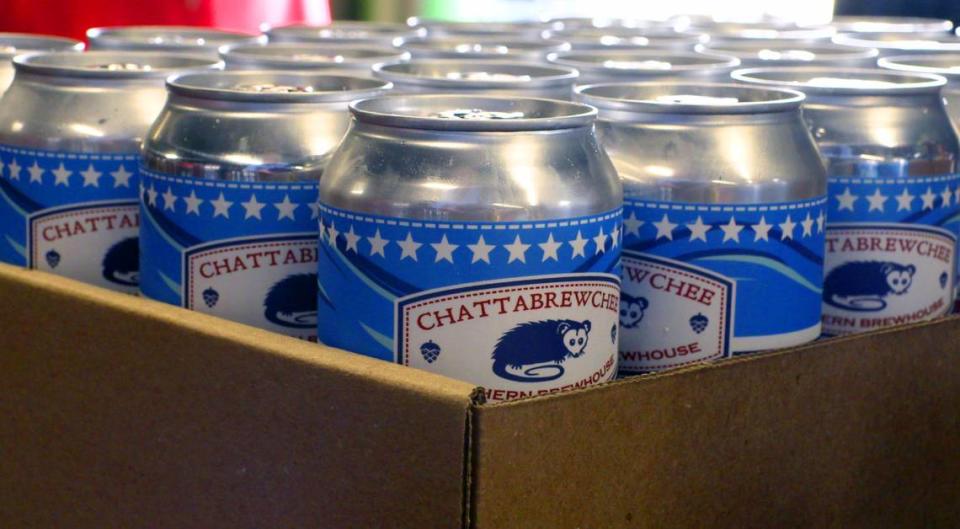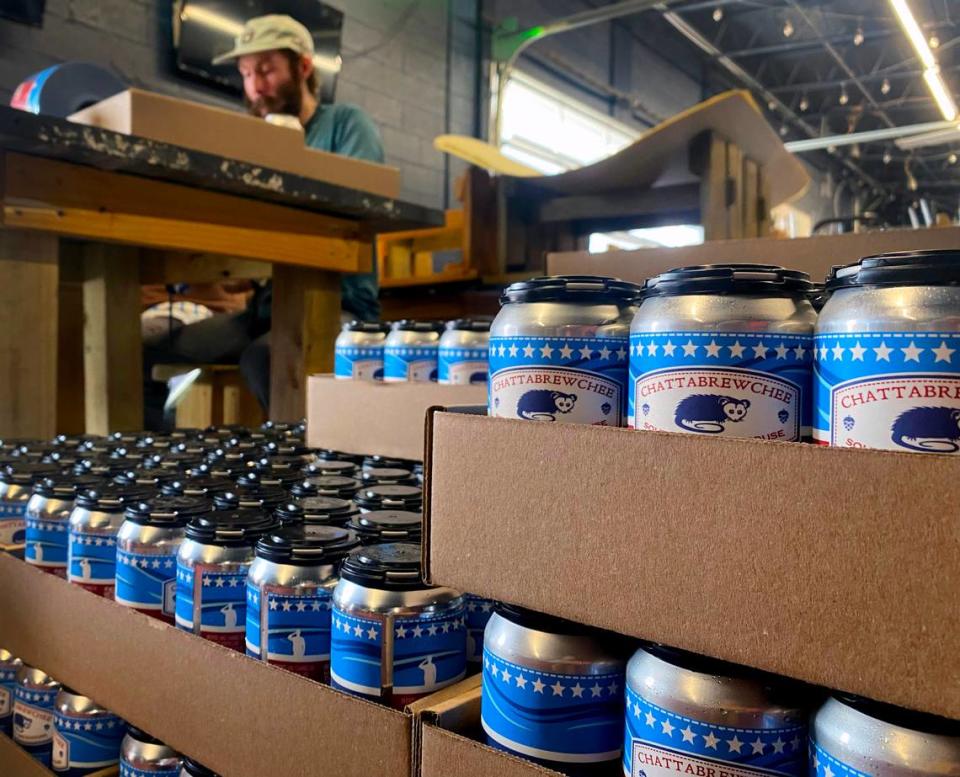Small breweries in Georgia disappointed in efforts to change century old regulations
There’s a consistent hum of machinery in the background and a whiff of paint in the air as Beau Neal, owner of Chattabrewchee Southern Brewhouse, places labels on freshly canned beer for his six-packs.
He’s invested a significant amount of his own capital into his business to keep things afloat, but Chattabrewchee’s struggles during this economic climate isn’t unique among Georgia breweries.
Amid closures, many brewers feel reforms to a century-old system in the state could help ease their financial burdens.
But efforts led by the Georgia Craft Brewers Guild to pass Senate Bill 163, aimed at providing flexibility from regulations, stalled when the bill failed to advance out of the state Senate Regulated Industries and Utilities committee.

The bill would accomplish four main changes to regulatory policies.
Allow limited self-distributions for small brewers.
Reform beer franchise laws to allow breweries to more easily terminate agreements with wholesalers
Remove limit of products breweries can sell to customers each day
Allow direct charitable contributions of beer
Wholesalers aggressively lobbied against this legislation for two years, Joseph Cortes, executive director of the Georgia Craft Brewers Guild, told the Ledger-Enquirer.
“We have reached out to try and work with them on some common sense reforms that would help our small businesses,” he said. “They have expressed zero interest in working with us to help enact some small reforms that would be meaningful to craft breweries across the state.”
An ‘antiquated’ system
After the Repeal of Prohibition in 1933 ended the nationwide ban on the manufacture, sale and transportation of alcohol, states created their own laws regulating the beverages.
Georgia adopted a three-tiered distribution system. Tier One represents the brewers and distillers, Tier Two represents distributors or wholesalers and Tier Three represents retailers.
“For small breweries across Georgia, we have a very, very antiquated regulatory system,” Cortes said.
Until 2017 when Senate Bill 85 passed, local craft breweries and distilleries weren’t allowed to sell products directly to their customers. They could only sell, at wholesale prices, to distributors.
This change gave breweries, like Chattabrewchee, the ability to sell a limited amount of beer to customers on-site.

“They changed the law to move forward with the rest of the country to allow breweries to stop doing tasting rooms and allow us to sell our own beer,” Neal said.
Despite passing S.B. 85, Georgia remains one of the most restrictive states to open and operate a small brewery, argues the Georgia Craft Brewers Guild.
With 171 breweries in the state, Georgia ranks 44th in breweries per capita, according to the Brewers Association. But the state ranks 13th in barrels of craft beer produced and 12th in economic impact.
Georgia is losing a brewery about every two weeks, Neal said.
“The current distribution system really is not economically viable for most small breweries,” Cortes said.
Self-Distribution and removing limits
Breweries can currently sell one case of beer per person per day, but this isn’t enough to be sustainable.
Self-distribution is the primary goal, Cortes said, because the model is necessary in the consumer-driven economy.
“The middleman is the problem,” Neal said.
Distributors take a percentage of the profits, he said, and they’re needed to get products to restaurants, bars and liquor stores. As a brewery in Georgia, Chattabrewchee is required to sign with a distributor, Neal said, while border states like North Carolina and Alabama have gotten rid of those laws.
Chattabrewchee doesn’t have any advertising, and it doesn’t make any money off the sale of its cans, bottles or kegs. The markup from selling in bars and stores is too much for the brewery to earn money, Neal said, but it is a way for them to advertise their product.
“It allows us to get our name out there,” he said. “So, we can get the customer from that.”

Most of Chattabrewchee’s profits come from customers visiting the brewery and drinking in the tap room.
However, under the current system, they can’t help customers who are looking to purchase large quantities of beer for parties or events because of the current laws.
“There’s a big military presence here,” Neal said. “And they come here wanting to bring this beer to a party. But they really can’t.”
For individuals looking to purchase large quantities of beer from a local brewery, they would have to purchase it from a retailer. This means the beer is sold from the brewery to a distributor and then to a retailer before it reaches the consumer.
“The markup for the middleman and the markup for the retailer are doubling or tripling the price of the beer by the time it gets to the consumer,” Neal said.
Most consumers move on to another mass-produced beer instead of buying local because it’s cheaper.
Despite how being able to sell more beer directly to consumers and to do more self-distribution would help his business, Neal is aware of the impact legislation like S.B. 163 would have on some distributors.
“It’s going to kill my guy,” he said. “Because my guy’s a small distributor that does particularly small business. The big places like Coors and Anheuser-Busch aren’t going to feel this at all.”
Chattabrewchee will continue to find ways to evolve and stay alive, Neal said. One of the changes Columbus residents can look forward to includes purchaseing a food truck, he said.
The Georgia Craft Brewers Guild is not backing down despite the setback, Cortes said. They plan to continue speaking out and searching for community support.
“We’ll continue to make the case with elected officials,” he said. “We believe it’s time for them to really step up and show some leadership with helping these small businesses.”


